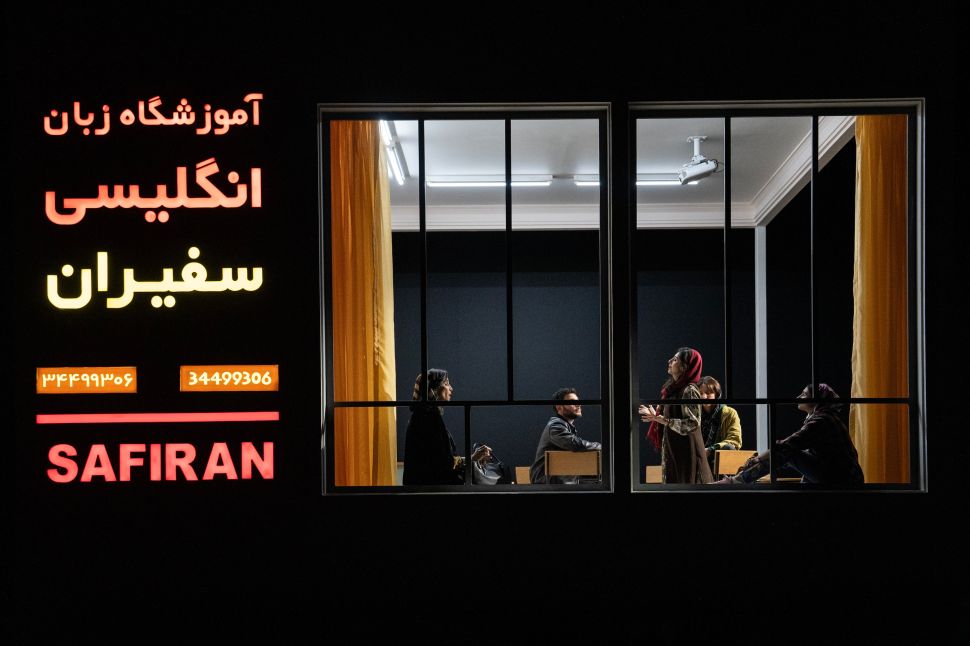A lifetime ago, I acted for an Iranian theater maker named Ashurbanipal Babilla who escaped Tehran during the revolution. Babilla’s blasphemous comedies were pretty unique even in the hurly-burly of the Off-Off avant-garde. He wrote and directed campy carnivals that pivoted from mythical to smutty with perverse glee: lurid titles, outrageous props, ample nudity. For years I socialized with Babilla and other members of the Iranian diaspora without ever picking up their language. Sure, I once performed a whole speech in Farsi (learned phonetically), but the only phrase I retain is something my dear, departed mentor taught me, a rude expression along the lines of, “Kiss my butt.” I regret my lack of Persian, which a character in English says always aspires to poetry. One takeaway from Sanaz Toossi’s gently wrenching drama is that none of us can truly enter the poetry of another language, no matter the intensity of desire. Emigrating to a strange lingo only cleaves one’s tongue in two.
Not all of Toossi’s characters suffer the same level of existential stress trying to remember indefinite determiners. Each of the Iranians training for the Test of English as a Foreign Language (TOEFL)—taught by the sweetly patient Marjan (Marjan Neshat)—has their own reason for forcing an accented “vaht” into “what.” Grandmotherly Roya (Pooya Mohseni) has a son living in Canada whose wife insists the mother-in-law get fluent before flying. Young and bubbly Goli (Ava Lalezarzadeh) says that chatting in the Queen’s E. makes her feel “three or four inches taller.” Omid (Hadi Tabbal) is a mystery: with his nearly undetectable accent, no one knows why he enrolled. Lastly is the class troublemaker, Elham (Tala Ashe). Brash, competitive, yet prone to spasms of insecurity, Elham has taken the TOEFL five times and failed. She wants to study gastroenterology in Australia, but despises English, finds speaking it “unnatural.” In sharp contrast, Marjan lived in Britain for nine years and admits, “I always liked myself better in English.”
While the action moves in a realistic register, Toossi captures the bilingual quality of the text with a neat theatrical device: when characters speak English, they have an accent, either light or thick. When they speak Farsi, it’s still English, but relaxed and unforced, allowing them to be their true selves, intelligible to us. Toward the end, when Marjan and Elham exchange a few lines in Farsi, the Anglophone audience finds itself (briefly) barred from comprehension.
In a series of relatively short blackout scenes that cover six weeks of Marjan’s course, we watch instructor and pupils toil away on conversational skills—making progress, smarting from setbacks, getting on each other’s nerves. This sort of group-portrait play is more a theme-centered vibe than a plot-driven machine, so don’t expect love affairs or government oppression to enter the picture. Politics arise only when Elham confides in Goli:
I have this amazing dream sometimes that the Persian Empire kept growing. And Cyrus the Great would still be our king. Instead of the Americans, the British, everyone telling us what to speak and how to say it, all of us would speak Farsi.
Granted, Elham’s fantasy seems a bit shoehorned into the dialogue, but she makes an important point. Mastering English is both an expansion of each student’s personal boundaries, and an implicit act of self-colonization: escape into a new confinement. We begin to discern a yawning emotional gulf between Roya and her son, which no amount of drilling verbs can fill. There’s both heat and melancholy in the dance of attraction between Omid and Marjan. His excellent speaking skills (eventually explained) delights the Anglophile teacher, who married a monolingual Iranian after returning home, “tired” of living abroad. What’s that story about? We don’t find out. Toossi tends to sketch, leaning on subtext, private lives kept partly in shadow. Such shorthand means that at 100 minutes, the play somewhat exhausts its characters’ back stories and sociolinguistic observations. (There are only so many ways a person can say they feel stranded between different speech modes.)
If the script fetishizes restraint, a hugely appealing cast fills the negative space. Neshat, a radiant presence who could have modeled a Botticelli Madonna, holds the center of the tale with good humor (and painful flickers of self-doubt). The forceful Ashe deftly treads the line between cruel and vulnerable in Elham, and Lalezarzadeh makes an adorable foil as a natural optimist. Tabbal has a trickier task in keeping Omid’s secret agenda hidden so long. Mohseni recedes from the action toward the end, but has a touching nighttime scene as Roya, bathed in a chemical yellow light, leaves emphatic yet dignified voicemails for her long-distance child. Easily one of the most cohesive ensembles I’ve seen in years, the performers make little acts of kindness or meanness resonate loud and clear.
English premiered in 2022 at the Atlantic Theater Company and the following year Toossi won the Pulitzer Prize for Drama. As now, I found the earlier iteration engaging, a wistful indie film with a magic-hour glow that suggests Terrence Malick gigging Off Broadway. Knud Adams translates his impeccable production to a Broadway venue without losing any of the original intimacy or fine-grained naturalism. The director smartly brings his superlative designers from the Atlantic: Marsha Ginsberg with her modular, deracinated classroom rotating in black void; evocative sunlight and streetlight by Reza Behjat filtering through pale amber curtains; and Enver Chakartash’s costumes—Western streetwear accented with jewel-toned scarves and accessories. Between this intensely focused and sensitive staging and his no-less powerful handling of Primary Trust, Adams must be on top of every young playwright’s vision board. Whatever dialect he’s speaking, it’s welcome on the ear. My mentor Babilla had crazier, more experimental tastes, but even he would have smiled to hear the music of his mother tongue.
English | 1hr 40mins. No intermission. | Todd Haimes Theatre | 227 West 42nd Street | 212-719-1300 | Buy Tickets Here

